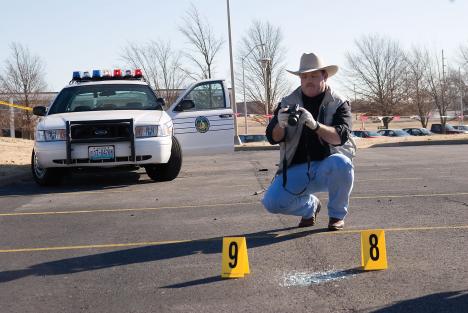Interns start semester off working with local reps

John Randall, Vernon County deputy sheriff, documents evidence photographically before it is collected to prevent evidence tampering.
With a growing need for help in the state capital, eight interns have been selected to work with the local representatives and senator.
These students are the first in a program developed through the regional development center in conjunction with University President Julio León.
The interns began the semester early by working with the representatives from the beginning of the legislative session.
“They are working 30 to 40 hours per week,” said Dr. Tom Simpson, professor of political science.
Simpson is helping to oversee the program, and the interns report to him each week.
“The kids are having a great time,” Simpson said. “They are meeting a lot of people.”
Simpson said the interns spend their time running errands, responding and organizing e-mails, sitting in on meetings and running bills back and forth between the floor and the representatives.
He said the interns will provide an outlook for future semesters through their feedback and responses.
“It’ll be instructive for us,” Simpson said. “I’m just proud of these kids.”
Jacob Heisten, senior political science major, was a later addition to the internship program as an opening with Sen. Gary Nodler (R-Joplin) allowed him to begin.
“I graduate in May, and I needed the internship hours,” Heisten said. “I kind of got lucky.”
Heisten said he is looking forward to the semester and the sessions, even if it is mostly clerical work.
He said he is especially looking forward to a mock legislative session open for interns to participate in instead of just legislators.
“If I like it, then I could possibly stay in the field up there and work my way into Missouri politics,” Heisten said.
Simpson said the students will benefit from the experience, and it is important to have good candidates for the first round of interns.
“I don’t know too many students who would quit their jobs and move up there,” he said.
León agreed.
“This will enhance their education tremendously,” he said. “I think they will receive an enhanced understanding of the political process.”
León said he received feedback from several representatives, especially from Rep. Marilyn Ruestman (R-Joplin), wanting to see more interns from Southern in the capital. He said he thought the idea was good and would also bring a better representation of Southern to the legislation.
“It helps our representatives obviously to have the initial help,” he said.
Dr. Richard Miller, head of the social sciences department, said he was glad to help in the process.
“Most other schools in the state have interns, and there is more need for interns than there are interns,” he said.
Miller said there were two existing internship programs, called Capitol Interns, at the state level, but they must meet different requirements to do so. These other interns can serve in any position and are not limited to Jefferson City.
The new program offers the students a 12-hour scholarship and a $1,000 stipend to offset the cost of living in Jefferson City.
Miller said the students were basically picked by hand.
“We know the students well,” he said.
Most of the students came from the department, but one student is in nursing.
Miller said all of the interns were well-placed, and he is thankful the students were willing to partake in the first run of the program.
He is also glad León asked him to work on the program.
“To put that money in our students, sight-unseen, says something about how he believes in our students,” Miller said.
The program is open to all majors and students may inquire about it and other opportunities in the social sciences department.
“We’re excited about it,” Miller said. “We hope to draw from across the campus.”
Your donation will support the student journalists of Missouri Southern State University. Your contribution will allow us to purchase equipment and cover our annual website hosting costs.



























